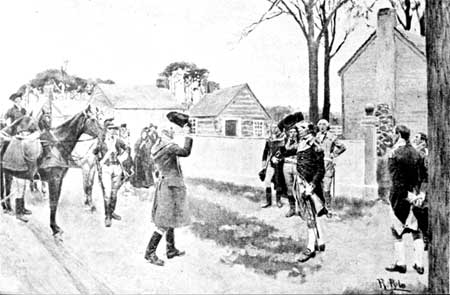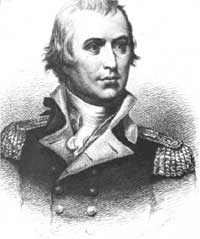|
KINGS MOUNTAIN National Military Park |
 |
The Meaning of the Victory
The lifting of the spirits of the patriots in the Carolinas and the renewal of their will to resist the British invader were important and immediate effects of Ferguson's defeat at Kings Mountain. News of this decisive victory spread rapidly through the region, bringing out stronger patriot militia forces in North Carolina and from nearby Virginia. It also revived patriot guerrilla warfare in South Carolina. Tories in the Carolinas became greatly discouraged and disorganized. The British did not immediately sense the importance of this sharp improvement in patriot morale and were inclined to discount the loss of the relatively small Tory force under Ferguson. At the headquarters of the British forces in New York it was even denied that the battle had taken place.
The unexpected success of the patriots at Kings Mountain caused a delay of almost 3 months in Cornwallis' northward advance. This was a serious loss of time which had a far-reaching effect upon his campaign in 1781. The immediate turn of events in the war in the South that came with the victory at Kings Mountain forced Cornwallis to abandon his foothold at Charlotte, in the unfriendly territory of North Carolina. Fearful that the patriots would try to regain control of key posts in South Carolina, he retreated to Winnsboro, in the upper part of that State. Here he took up a defensive position during the first part of the winter of 1780—81 to await reinforcements sent south by General Clinton. Although ill during most of this period, Cornwallis attempted to regain the support of his former Tory allies in the region and to plan a second invasion of North Carolina.

General Greene (left) meets General Gates at Charlotte, N. C., to
assume command of the Southern Department of the Continental Army in
December 1780.
 Gen. Nathanael Greene, American Commander in the South, 1780—81. Courtesy Emmet Collection, New York Public Library. |
Patriot leaders took advantage of his enforced halt at Winnsboro and organized a new offensive in the South. At Charlotte, early in December 1780, Gen. Nathanael Greene replaced General Gates as American commander in the South, with the resolve to "recover this country or die in the attempt." Greene divided his small, ill-equipped army into two partisan forces and directed them to distract Cornwallis by threatening Camden on his right and Ninety-six on his left. This daring plan gave Greene the military initiative in the Carolinas during 1781.
It led to the notable patriot victory at the Cowpens, on January 17, and was followed by the strategic American withdrawal across North Carolina, which dissipated Cornwallis' strength and strained his supply line. On March 15 Cornwallis overtook Greene and forced him from the field at the Battle of Guilford Courthouse, but British losses were so serious that Cornwallis retired to Wilmington, N. C., for rest and new supplies. All of these actions were important links in the chain of events after Kings Mountain which led Cornwallis along the road to Yorktown. From Wilmington, Cornwallis undertook his dramatic campaign in Virginia which ended with his surrender on October 19 to General Washington's victorious American and French forces at the siege of Yorktown. The 6 years of war in the American Revolution were over and American independence was assured.
The Kings Mountain expedition and engagement illustrate the characteristic vigor of the untrained American colonial frontiersman in rising to the threat of border invasion. These events are memorable as examples of the personal valor and resourcefulness of the American frontier fighter, particularly the Scotch-Irish, during the Revolution. The battle is a stirring record of the mountain man's unerring marksmanship. It was truly a hunting-rifle victory.

|
|
Last Modified: Mon, Dec 2 2002 10:00:00 am PDT |


